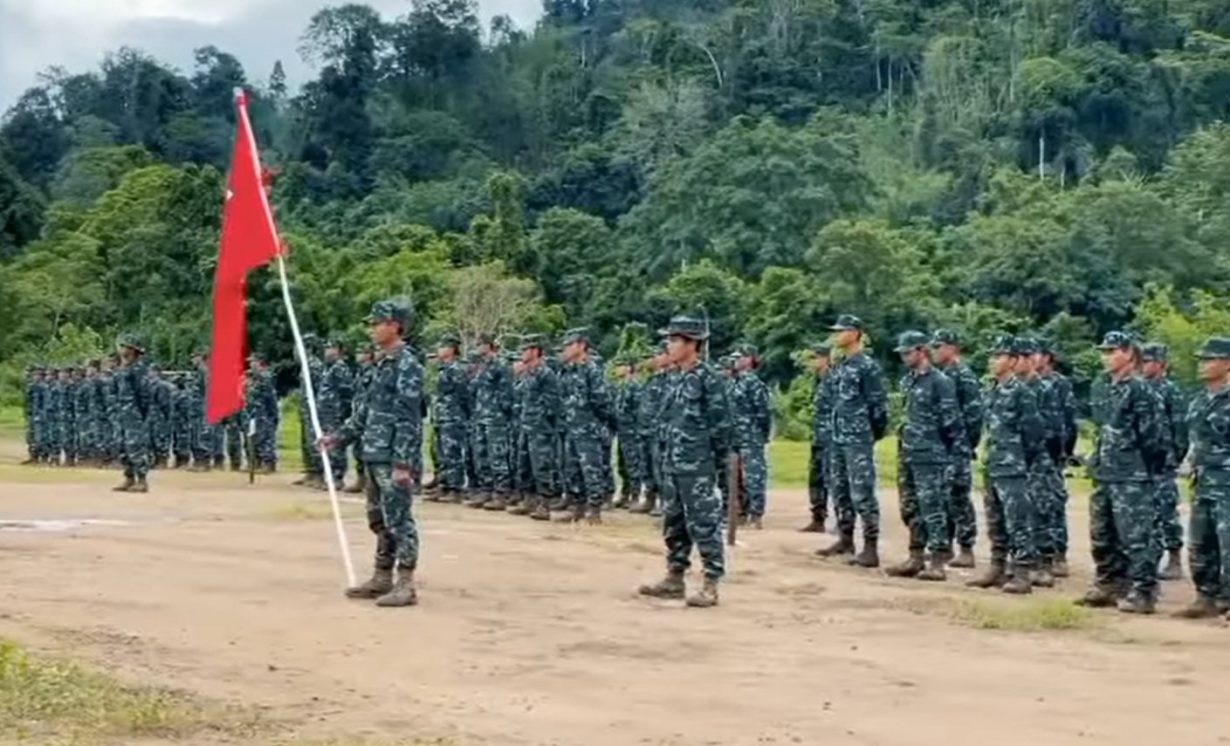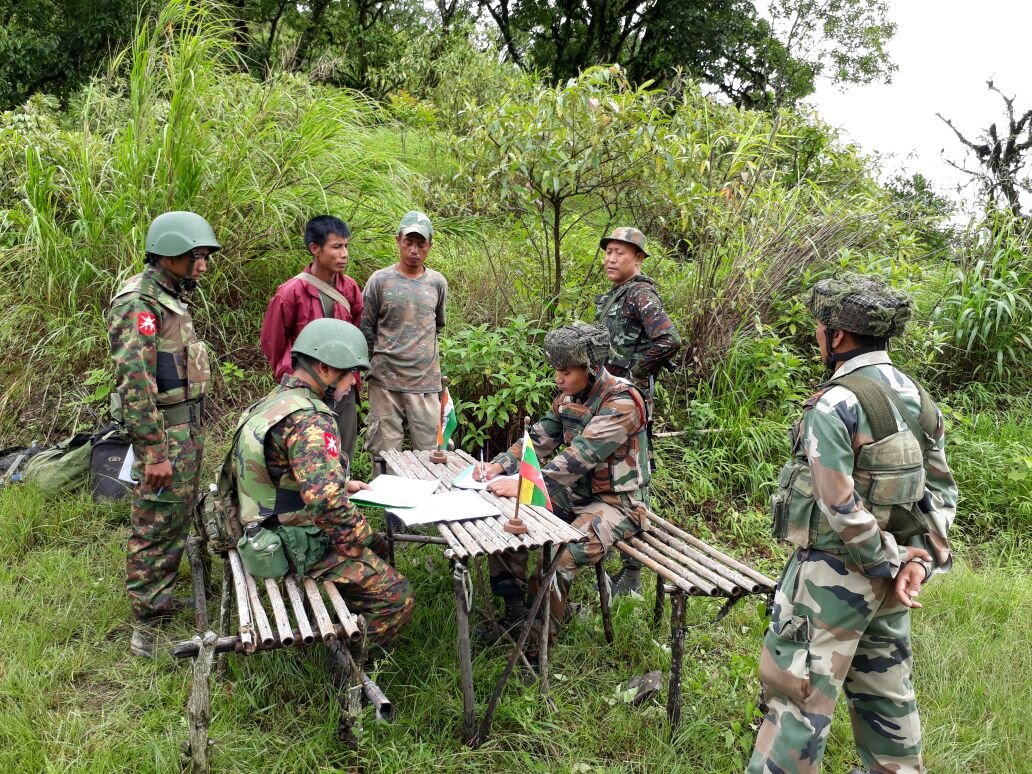OPED By Vaishali Basu Sharma
Myanmar’s military, known as the Tatmadaw, is facing its biggest threat since it seized power two-and-a-half years ago. In a significant challenge, the military junta is battling ethnic insurgent groups to keep control of the country’s border towns.
Different groups of well-armed rebels have joined forces for the first time and are gaining ground to restore democratic rule. The violence is causing people to flee to neighboring countries, bringing internal unrest to the world stage.
After the takeover of the government by the Tatmadaw in a February 2021 coup, ethnic rebel groups based mainly in Myanmar’s peripheral regions have organized armed opposition to the junta. In recent advances, rebels have seized nearly a hundred outposts in the north of the country, including several vital towns and critical trade routes.
The offensive began last month in Shan State. Behind it is an alliance of three ethnic armies. They aim to overthrow the military junta and restore democratic rule. Their gains have encouraged resistance forces elsewhere in the country, seizing several towns.
The military-installed-President Myint Swe has warned that the country is in danger of breaking apart, saying that Myanmar would “split into various parts” if the government “did not effectively manage the incidents happening in the border region.”

The rebels have seized over 8,000 square kilometers. These advances were made over a set of four offensives up till now.
The first was on October 27 during Operation 1027, undertaken by the “Three Brotherhood Alliance” comprising three ethnic groups — the Myanmar National Democratic Alliance Army (MNDAA), the Ta’ang National Liberation Army (TNLA), and the Arakan Army (AA), in northern Shan State. Amongst the Brotherhood alliances were fighters from Rakhine state, situated further SouthWest of the country.
This was followed by a second offensive, ‘Operation 1107’, undertaken on November 7, in which the Karreni resistance forces captured at least two military bases in the southeastern Kayah State. Operation 1107 was launched to liberate Kayah State and support the resistance’s advance to Pyinmana, near the junta’s Naypyitaw fortress.
Last Monday, the Arakan Army in Rakhine State undertook the most recent offensives. This is crucial because they were, in fact, in a ceasefire agreement with the Tatmadaw before launching the offensive. Finally, on the same day, the Chin resistance, which had been relatively effective in fighting against the military junta, also seized other territories.
Beginning Of Junta’s End?
Indications are that a situation where all the border areas are virtually in the hands of the resistant forces has emerged, and the military/Tatmadaw seems to have lost control. Media reports suggest that approximately 447 junta personnel have given up their weapons and surrendered in northern Shan State, Kayah, Chin, Rakhine, and Mon states and Sagaing and Magwe regions in the last few weeks.
The critical phase will begin when the ethnic resistance forces challenge the Myanmar heartland, especially north of Mandalay. The question is whether these successes will encourage the Myanmar opposition to join the rebel forces, creating a complicated situation for the military government.
Defense Minister for the Civilian National Unity Government, U Yee Mon, has hinted at this possibility by stating that resistance operations across the country are now being coordinated under a single nationwide strategy.

As the fighting spreads, the humanitarian impact on the local population worsens. Even before this current offensive, there were already several million people displaced. These displacement camps have also become targets for air strikes by the Junta, which enjoys a military advantage in air power and air mobility.
Reports indicate that the military government cannot send reinforcements to areas under attack, either in terms of retaking or assisting the forces already fighting the rebels.
As the pro-democracy ethnic rebellion continues to take more and more places, the junta is expected to withdraw to Naypyidaw and try to control the major centers like the financial capital, Yangon. The military government has arrested almost 20,000 people, a figure which increases almost daily.
China Plays Both Sides
China has strategic interests in Myanmar. They have a railway line project through Mandalay and pipelines going to the Bay of Bengal. While China has been backing the military Junta, there have been reports that the current ethnic offensives couldn’t have gone forward without support from Beijing.
The most potent ethnic armed organization that controls an autonomous region within Myanmar’s northeastern Shan State, the United Wa State Army (UWSA), enjoys significant material and political support from Beijing.
Although the Wa Army has said that it won’t take sides in the ongoing fighting between the Myanmar regime and an ethnic alliance, it remains a significant arms supplier to the ethnic armed forces. So basically, even as Beijing is officially supporting the Junta, it is also supplying arms to the ethnic rebels.
The Chinese have good working relations with Aung San Suu Kyi’s political party, the National League for Democracy, which was in power from 2015 to 2020. Its interest lies in a return of stability in Myanmar so that the energy projects it has invested in can be safely resumed.
Myanmarese Seek Refuges In India
Meanwhile, thousands of Myanmar nationals have crossed over into India to escape the intense fighting between the rebels and Myanmar military since last week.
This included almost 47 Myanmar army officials who also crossed the international border and surrendered before the state police in the Indian border state of Mizoram, which shares a 510-km-long border with Myanmar’s Chin state.
These army personnel were later taken to the border town of Moreh in Manipur, where they were handed over to Myanmar military officials.
- Vaishali Basu Sharma is an analyst of strategic and economic affairs. She has worked as a consultant with India’s National Security Council Secretariat (NSCS) for nearly a decade. She is presently associated with the New Delhi-based think tank Policy Perspectives Foundation.
- The author can be reached at postvaishali (at) gmail (dot) com.




